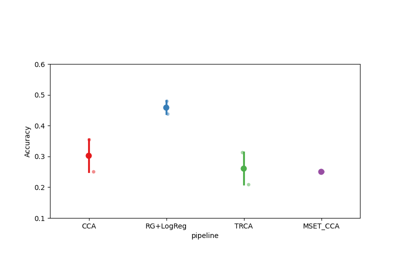moabb.evaluations.CrossSubjectEvaluation#
- class moabb.evaluations.CrossSubjectEvaluation(paradigm, datasets=None, random_state=None, n_jobs=1, overwrite=False, error_score='raise', suffix='', hdf5_path=None, additional_columns=None, return_epochs=False, return_raws=False, mne_labels=False, n_splits=None, save_model=False, cache_config=None, optuna=False, time_out=900, verbose=None)[source]#
Cross-subject evaluation performance.
Evaluate performance of the pipeline trained on all subjects but one, concatenating sessions.
- Parameters:
paradigm (Paradigm instance) – The paradigm to use.
datasets (List of Dataset instance) – The list of dataset to run the evaluation. If none, the list of compatible dataset will be retrieved from the paradigm instance.
random_state (int, RandomState instance, default=None) – If not None, can guarantee same seed for shuffling examples.
n_jobs (int, default=1) – Number of jobs for fitting of pipeline.
overwrite (bool, default=False) – If true, overwrite the results.
error_score ("raise" or numeric, default="raise") – Value to assign to the score if an error occurs in estimator fitting. If set to ‘raise’, the error is raised.
suffix (str) – Suffix for the results file.
hdf5_path (str) – Specific path for storing the results and models.
additional_columns (None) – Adding information to results.
return_epochs (bool, default=False) – use MNE epoch to train pipelines.
return_raws (bool, default=False) – use MNE raw to train pipelines.
mne_labels (bool, default=False) – if returning MNE epoch, use original dataset label if True
save_model (bool, default=False) – Save model after training, for each fold of cross-validation if needed
cache_config (bool, default=None) – Configuration for caching of datasets. See
moabb.datasets.base.CacheConfigfor details.n_splits (int, default=None) – Number of splits for cross-validation. If None, the number of splits is equal to the number of subjects.
Notes
Added in version 1.1.0: Add save_model, cache_config and n_splits parameters
- evaluate(dataset, pipelines, param_grid, process_pipeline, postprocess_pipeline=None)[source]#
Evaluate results on a single dataset.
This method return a generator. each results item is a dict with the following conversion:
res = {'time': Duration of the training , 'dataset': dataset id, 'subject': subject id, 'session': session id, 'score': score, 'n_samples': number of training examples, 'n_channels': number of channel, 'pipeline': pipeline name}
- is_valid(dataset)[source]#
Verify the dataset is compatible with evaluation.
This method is called to verify dataset given in the constructor are compatible with the evaluation context.
This method should return false if the dataset does not match the evaluation. This is for example the case if the dataset does not contain enough session for a cross-session eval.
- Parameters:
dataset (dataset instance) – The dataset to verify.
